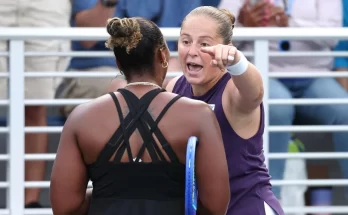GOAT Status Sealed: Tim Tebow Declared Greatest College Football Player of All Time, Eclipsing Legends Like Herschel Walker and Archie Griffin.
The debate that has raged for decades among college football fans, analysts, and former players may have finally reached its conclusion. Tim Tebow, the former Florida Gators quarterback and two-time national champion, is now widely regarded as the greatest college football player of all time. While the title of “GOAT” has been passed around and debated with names like Herschel Walker, Archie Griffin, Bo Jackson, Barry Sanders, and Vince Young all entering the conversation, Tebow’s total body of work—his on-field production, leadership, accolades, and cultural impact—has set him apart in ways few athletes can rival.
Tebow’s collegiate legacy began in 2006 when he arrived at the University of Florida as a five-star recruit with a bruising running style and a fiery, infectious energy. Even as a freshman, playing behind senior quarterback Chris Leak, Tebow made a difference in situational packages. He helped Florida win the 2006 national championship with timely short-yardage plays and an unmistakable spark that would become his trademark. But it wasn’t until the following season that the college football world began to understand just how unique Tebow truly was.
In 2007, Tebow became the first sophomore in college football history to win the Heisman Trophy. That season, he accounted for 55 total touchdowns—32 passing and 23 rushing—while throwing for over 3,000 yards and rushing for nearly 900 more. It was a season that showcased Tebow’s ability to impact the game in multiple ways. He was not just a quarterback who could run; he was a running back in a quarterback’s body with the arm talent and football IQ of a traditional pocket passer. That dual-threat capability made Florida’s offense nearly unstoppable and forced defenses to change the way they prepared.
But Tebow’s greatness wasn’t confined to his stats, as eye-popping as they were. His leadership, toughness, and unshakeable will to win were every bit as valuable. Following a tough 2008 loss to Ole Miss in The Swamp, Tebow delivered what would become known as “The Promise” in a postgame press conference. With tears in his eyes and passion in his voice, he vowed that no player in the country would outwork him and that Florida would not lose again that season. True to his word, the Gators ran the table, won the SEC Championship against then-No. 1 Alabama, and went on to defeat Oklahoma in the BCS National Championship Game. Tebow was named the game’s Offensive MVP, cementing his legacy as a champion.
Across his four-year career, Tebow was a three-time Heisman finalist, winning once and finishing in the top five in each of his last three seasons. He ended his collegiate career with a 35–6 record as a starter, two national titles (2006, 2008), and a laundry list of SEC and NCAA records. His 145 total touchdowns, combined with his 12,232 yards of total offense, remain among the highest totals in college football history. More than numbers, though, Tebow was the heart and soul of Urban Meyer’s Florida program, and many consider that era the most dominant stretch in modern SEC history before Alabama’s dynasty took over.
Comparisons to other all-time greats only serve to elevate Tebow’s standing. Herschel Walker was a transcendent athlete who carried Georgia to a national title in 1980 and earned a Heisman Trophy in 1982. Walker was a battering ram with world-class speed and durability who posted gaudy rushing numbers and set an early standard for SEC excellence. Archie Griffin, the only two-time Heisman Trophy winner, led Ohio State to four Big Ten titles and was the model of consistency. Bo Jackson dazzled with raw athleticism, and Vince Young’s 2006 Rose Bowl performance remains one of the most iconic single-game displays in history.
Still, none of those legends matched Tebow’s unique combination of hardware, leadership, statistics, and longevity. Tebow wasn’t a one- or two-year wonder. He sustained elite play for nearly four full seasons while carrying Florida through the hyper-competitive SEC at a time when every week felt like a heavyweight fight. He never wavered in big moments. His leadership galvanized teams. His toughness set the tone. And his competitive drive was unmatched. In an era where football was evolving, Tebow defined what it meant to be a dual-threat quarterback before it became trendy.
What separates Tebow from most college football greats is not only what he accomplished, but how he did it. He embraced the college experience fully, never departing early for the NFL, never skipping a game, and never showing signs of complacency. He became a folk hero in Gainesville and a household name across the nation. Fans remember him for the jump passes, the punishing runs near the goal line, the emotional speeches, and the unmistakable eye black etched with Bible verses. He was not only a competitor but a symbol of faith, work ethic, and resilience.
His impact off the field only amplifies his case. Tebow inspired millions with his outspoken beliefs and philanthropic efforts. While these don’t win football games, they elevated his profile into the rare air where athletic achievement meets cultural icon status. College football is about more than wins and losses—it’s about passion, tradition, and inspiration. In all those areas, Tebow delivered in abundance.
Critics of Tebow’s GOAT status often point to his less-than-stellar NFL career as a knock on his overall football legacy. But this is a category strictly focused on college performance. What Tebow did in college, and the level at which he sustained it, remains virtually unparalleled. Some argue that players like Reggie Bush, Lamar Jackson, or Johnny Manziel brought similar excitement, but none matched Tebow’s consistency over four years or led their teams to the same level of sustained success. Others point to Griffin’s two Heismans or Sanders’ 1988 explosion as stronger peaks. But neither commanded the same level of leadership or left as indelible a mark on the sport.
The debate will never fully disappear—college football thrives on legacy, loyalty, and passionate disagreement. Fans will always rally around their school’s heroes, and rightfully so. But if there’s one player whose name continues to rise above the rest in discussion after discussion, year after year, it’s Tim Tebow. His story represents more than championships and trophies; it’s about redefining what greatness looks like at the college level. He was a player who transcended positions, shattered expectations, and made believers out of even the most skeptical observers.
Tebow’s influence also reshaped recruiting, as high school players and coaches sought to model themselves after his mold. His work ethic became the gold standard. Quarterbacks wanted to emulate his power-run style and emotional leadership. College programs began searching not just for athletes, but for culture-changers—the exact kind of player Tebow was. His fingerprints are on the modern evolution of the college game, especially in how quarterbacks are evaluated, developed, and expected to lead.
There’s a reason why every few years, when a dominant college football player emerges, the media inevitably asks, “Is he the next Tim Tebow?” That’s not just a tribute to Tebow’s skill—it’s recognition of his standard. And so far, no one has truly lived up to it.
What Tebow did for Florida and college football at large remains unforgettable. His jersey, No. 15, is a symbol of a golden era. His influence echoes through the Swamp with every Gator chant and echoes nationally in the way people remember the game from that era. From sold-out stadiums to SEC dominance, Heisman moments to national titles, Tebow wasn’t just a great player—he was the face of a generation of college football.
The numbers speak loudly. The championships shout even louder. But what seals the deal is the way teammates followed him, the way fans adored him, and the way he carried the game on his shoulders. For four years, Tim Tebow didn’t just play college football—he embodied it. And in the long, winding story of college football greatness, his chapter may be the most compelling of them all.
The GOAT debate will always have contenders. Herschel Walker will always be cherished in Athens. Archie Griffin will always have his special place in Columbus. But across the college football landscape, more and more fans, writers, and analysts are coming to the same conclusion: the greatest of them all wore orange and blue, delivered speeches that stirred the soul, and played the game like his life depended on it.
Tim Tebow is not just a former player. He is a symbol of what college football can be at its best—fierce, passionate, inspirational, and transformative. And for that reason, the debate may finally be over. The GOAT has been crowned, and his name is Tim Tebow.



